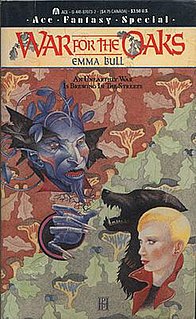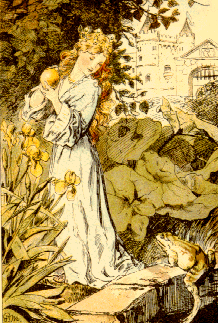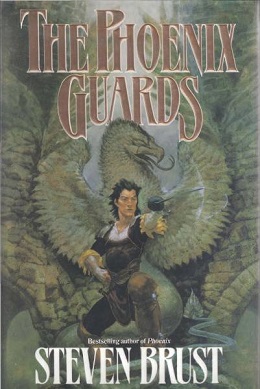
Steven Karl Zoltán Brust is an American fantasy and science fiction author of Hungarian descent. He is best known for his series of novels about the assassin Vlad Taltos, one of a disdained minority group of humans living on a world called Dragaera. His recent novels also include The Incrementalists (2013) and its sequel The Skill of Our Hands (2017), with co-author Skyler White.

"Sleeping Beauty", or "Little Briar Rose", also titled in English as "The Sleeping Beauty in the Woods", is a classic fairy tale about a princess who is cursed to sleep for a hundred years by an evil fairy, to be awakened by a handsome prince at the end of them. The good fairy, realizing that the princess would be frightened if alone when she awakens, uses her wand to put every living person and animal in the palace asleep, to awaken when the princess does.
The d'Artagnan Romances are a set of three novels by Alexandre Dumas (1802–1870), telling the story of the 17th-century musketeer d'Artagnan.
Charles de Lint is a Canadian writer of Dutch, Spanish, and Japanese ancestry. He is married to, and plays music with, MaryAnn Harris.

Emma Bull is an American science fiction and fantasy author. Her novels include the Hugo- and Nebula-nominated Bone Dance and the urban fantasy War for the Oaks. She is also known for a series of anthologies set in Liavek, a shared universe that she created with her husband, Will Shetterly. As a singer, songwriter, and guitarist, she has been a member of the Minneapolis-based folk/rock bands Cats Laughing and The Flash Girls.

War for the Oaks (1987) is a fantasy novel by American writer Emma Bull. The book tells the story of Eddi McCandry, a rock musician who finds herself unwillingly pulled into the supernatural faerie conflict between good and evil. War for the Oaks is one of the first works in the subgenre of urban fantasy: although it involves supernatural characters, the setting (Minneapolis) is decidedly real-world.

The Benedictine Pannonhalma Archabbey or Territorial Abbey of Pannonhalma is a medieval building in Pannonhalma, one of the oldest historical monuments in Hungary. Founded in 996, it is located near the town, on top of a hill. Saint Martin of Tours is believed to have been born at the foot of this hill, hence its former name, Mount of Saint Martin, from which the monastery occasionally took the alternative name of Márton-hegyi Apátság. This is the second largest territorial abbey in the world, after the one in Monte Cassino.

The Roman Catholic Archdiocese of Esztergom–Budapest is the primatial seat of the Roman Catholic Church in Hungary and the Metropolitan of one of its four Latin rite ecclesiastical provinces.

"The Frog Prince; or, Iron Henry" is a German fairy tale collected by the Brothers Grimm and published in 1812 in Grimm's Fairy Tales. Traditionally, it is the first story in their folktale collection. The tale is classified as Aarne-Thompson type 440.

Brokedown Palace is a 1999 American drama film directed by Jonathan Kaplan, and starring Claire Danes, Kate Beckinsale, Bill Pullman and Lim Kay Tong. It deals with two American friends imprisoned in Thailand for alleged drug smuggling. Its title is taken from a Grateful Dead song written by Jerry Garcia and Robert Hunter from their 1970 album American Beauty.

Ivanhoe is a 1952 British-American historical adventure epic film directed by Richard Thorpe and produced by Pandro S. Berman for Metro-Goldwyn-Mayer. The film was shot in Technicolor, with a cast featuring Robert Taylor, Elizabeth Taylor, Joan Fontaine, George Sanders, Emlyn Williams, Finlay Currie, and Felix Aylmer. The screenplay is written by Æneas MacKenzie, Marguerite Roberts, and Noel Langley, based on the 1819 historical novel Ivanhoe by Sir Walter Scott.

Phoenix is a fantasy novel by American writer Steven Brust, the fifth book in his Vlad Taltos series, set in the fantasy world of Dragaera. Originally published in 1990 by Ace Books, it was reprinted in 2002 along with Taltos in the omnibus The Book of Taltos. Following the trend of the Vlad Taltos books, it is named after one of the Great Houses and features that house as an important element to its plot.

Taltos is a fantasy novel by American writer Steven Brust, the fourth book in his Vlad Taltos series, set in the fantasy world of Dragaera. Originally published in 1988 by Ace Books, it was reprinted in 2002 along with Phoenix as part of the omnibus The Book of Taltos. It does not follow the trend of being named after one of the Great Houses of the Dragaeran Empire, and instead takes its title from its protagonist. Due to the series being written out of chronological order, the events of this book are actually the earliest in the series' timeline.

The Bastard Prince is a fantasy novel by American-born author Katherine Kurtz. It was first published by Del Rey Books in 1994. It was the twelfth of Kurtz' Deryni novels to be published, and the third book in her fourth Deryni trilogy, The Heirs of Saint Camber. Although the Heirs trilogy was the fourth Deryni series to be published, it is a direct sequel to the second trilogy, The Legends of Camber of Culdi. The next Deryni novel to be published, King Kelson's Bride, was a direct sequel to the Histories of King Kelson trilogy, but the internal literary chronology of the series was later continued in In the King's Service, the first book of the Childe Morgan trilogy.

The Phoenix Guards is a fantasy novel by American writer Steven Brust, the first novel in the Khaavren Romances series, set in the fictional world of Dragaera. Like the other books in that series, the novel is heavily influenced by the d'Artagnan Romances written by Alexandre Dumas, and is written by Brust in the voice and persona of a Dragaeran novelist, Paarfi of Roundwood, whose style is a tongue-in-cheek parody of Dumas, matching both his swashbuckling sense of adventure and his penchant for tangents and longwindedness. Brust describes the book as "a blatant ripoff of The Three Musketeers." The Khaavren Romances books have all used Dumas novels as their chief inspiration, recasting the plots of those novels to fit within Brust's established world of Dragaera. The next several books in the cycle are inspired by the subsequent Musketeers books, while 2020's The Baron of Magister Valley uses The Count of Monte Cristo as a starting point.
The Viscount of Adrilankha is a fantasy novel by American writer Steven Brust, published in three volumes. Collectively, the three books form the third novel in the Khaavren Romances series. It is set in the fantasy world of Dragaera. Like the other books in the series, the novel is heavily influenced by and homages the d'Artagnan Romances written by Alexandre Dumas, and is written by Brust in the voice and persona of a Dragaeran novelist, Paarfi of Roundwood, whose style is a tongue-in-cheek parody of Dumas, matching both his swashbuckling sense of adventure and his penchant for tangents and longwindedness. The book's format and title correspond with The Vicomte de Bragelonne, the multi-volume third book of the d'Artagnan Romances. The Khaavren Romances books have all used Dumas novels as their chief inspiration, recasting the plots of those novels to fit within Brust's established world of Dragaera. The first five books in the cycle are inspired by the Musketeers books, while 2020's The Baron of Magister Valley uses The Count of Monte Cristo as a starting point.

Jhegaala is a fantasy novel by American writer Steven Brust, the eleventh book in his Vlad Taltos series, set in the fantasy world of Dragaera. It was published in 2008. Following the trend of the series, it is named after one of the Great Houses and usually features that House as an important element to its plot.
Boiled in Lead is a rock/world-music band based in Minneapolis, Minnesota, and founded in 1983. Tim Walters of MusicHound Folk called the group "the most important folk-rock band to appear since the 1970s." Influential record producer and musician Steve Albini called the band's self-titled first album "the most impressive debut record from a rock band I've heard all year." Their style, sometimes called "rock 'n' reel," is heavily influenced by Celtic music, folk, and punk rock, and has drawn them praise as one of the few American bands of the 1980s and 1990s to expand on Fairport Convention's rocked-up take on traditional folk. Folk Roots magazine noted that Boiled in Lead's "folk-punk" approach synthesized the idealistic and archival approach of 1960s folk music with the burgeoning American alternative-rock scene of the early 1980s typified by Hüsker Dü and R.E.M. The band also incorporates a plethora of international musical traditions, including Russian, Turkish, Bulgarian, Scottish, Vietnamese, Hungarian, African, klezmer, and gypsy music. Boiled in Lead has been hailed as a pioneering bridge between American rock and international music, and a precursor to Gogol Bordello and other gypsy-punk bands. While most heavily active in the 1980s and 1990s, the group is still performing today, including annual St. Patrick's Day concerts in Minneapolis. Over the course of its career, Boiled in Lead has released nearly a dozen albums and EPs, most recently 2012's The Well Below.
Maria is the title given to a Filipino version of Cinderella collected by Fletcher Gardner and published in The Journal of American Folklore, in 1906. The story is related both to the international Cinderella narrative, as well as to the motif of the calumniated wife.














